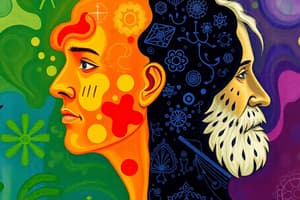Podcast
Questions and Answers
Which developmental psychologist focused primarily on the social aspects of personality growth?
Which developmental psychologist focused primarily on the social aspects of personality growth?
- John Bowlby
- Jean Piaget
- Erik Erikson (correct)
- Mary Ainsworth
Which parenting style is characterized by high levels of warmth and responsiveness combined with clear expectations and enforcement of rules?
Which parenting style is characterized by high levels of warmth and responsiveness combined with clear expectations and enforcement of rules?
- Permissive parenting
- Neglectful parenting
- Authoritative parenting (correct)
- Authoritarian parenting
In Erikson's psychosocial stages of development, which stage involves the conflict between Trust and Mistrust?
In Erikson's psychosocial stages of development, which stage involves the conflict between Trust and Mistrust?
- Autonomy vs. Shame/Doubt
- Trust vs. Mistrust (correct)
- Generativity vs. Stagnation
- Industry vs. Inferiority
How do motor and language development relate to cognitive growth in children?
How do motor and language development relate to cognitive growth in children?
Which theory explores the emotional bonds children form with their primary caregivers?
Which theory explores the emotional bonds children form with their primary caregivers?
What are the potential negative consequences of insecure attachment styles?
What are the potential negative consequences of insecure attachment styles?
Which of the following is NOT one of Piaget's stages of cognitive development?
Which of the following is NOT one of Piaget's stages of cognitive development?
According to Piaget, during which stage do children begin to develop the ability to use symbols and engage in symbolic play?
According to Piaget, during which stage do children begin to develop the ability to use symbols and engage in symbolic play?
What is the primary focus of Erik Erikson's theory of psychosocial development?
What is the primary focus of Erik Erikson's theory of psychosocial development?
Which theory emphasizes the importance of a secure attachment between an infant and their primary caregiver(s) for healthy social and emotional development?
Which theory emphasizes the importance of a secure attachment between an infant and their primary caregiver(s) for healthy social and emotional development?
Which aspect of development is primarily concerned with the acquisition of physical skills, such as rolling over, crawling, and walking?
Which aspect of development is primarily concerned with the acquisition of physical skills, such as rolling over, crawling, and walking?
Which parenting style is characterized by high levels of warmth and responsiveness, as well as clear and consistent expectations for behavior?
Which parenting style is characterized by high levels of warmth and responsiveness, as well as clear and consistent expectations for behavior?
Which developmental theory emphasizes the importance of social interaction and relationships in shaping personality and growth?
Which developmental theory emphasizes the importance of social interaction and relationships in shaping personality and growth?
Which parenting style is characterized by high demands and low responsiveness to a child's needs?
Which parenting style is characterized by high demands and low responsiveness to a child's needs?
According to attachment theory, what forms the basis for later social and emotional development?
According to attachment theory, what forms the basis for later social and emotional development?
Which of the following is a key aspect of motor development?
Which of the following is a key aspect of motor development?
In Piaget's stages of cognitive development, which stage involves the ability to think logically and solve problems?
In Piaget's stages of cognitive development, which stage involves the ability to think logically and solve problems?
Which of Erikson's psychosocial stages involves the conflict between industry and inferiority?
Which of Erikson's psychosocial stages involves the conflict between industry and inferiority?
According to Piaget's theory, during which stage do children begin to understand the concept of conservation?
According to Piaget's theory, during which stage do children begin to understand the concept of conservation?
In Erikson's theory, which stage involves the conflict between Intimacy and Isolation?
In Erikson's theory, which stage involves the conflict between Intimacy and Isolation?
What is the primary focus of attachment theory?
What is the primary focus of attachment theory?
Which parenting style is characterized by low levels of warmth and responsiveness, as well as high levels of control and strict rules?
Which parenting style is characterized by low levels of warmth and responsiveness, as well as high levels of control and strict rules?
According to Erikson's theory, which stage involves the conflict between Generativity and Stagnation?
According to Erikson's theory, which stage involves the conflict between Generativity and Stagnation?
Flashcards
Piaget's Stages
Piaget's Stages
Four stages of cognitive development: Sensorimotor, Preoperational, Concrete Operational, and Formal Operational.
Sensorimotor Stage
Sensorimotor Stage
First stage of Piaget's theory, focusing on sensory exploration and motor skills.
Preoperational Stage
Preoperational Stage
Second stage, where kids use symbols but have limited logical thought.
Concrete Operational Stage
Concrete Operational Stage
Signup and view all the flashcards
Formal Operational Stage
Formal Operational Stage
Signup and view all the flashcards
Erikson's Stages
Erikson's Stages
Signup and view all the flashcards
Attachment Theory
Attachment Theory
Signup and view all the flashcards
Secure Attachment
Secure Attachment
Signup and view all the flashcards
Parenting Styles
Parenting Styles
Signup and view all the flashcards
Authoritative Parenting
Authoritative Parenting
Signup and view all the flashcards
Study Notes
Developmental Psychology: Understanding Human Development Through Piaget's Cognitive Stages, Erikson's Psychosocial Stages, Attachment Theory, Motor and Language Development, and Parenting Styles
Introduction
Developmental psychology refers to the scientific study of psychological growth and change throughout the human lifespan. This field provides valuable insights into various aspects of human development, including cognitive development, psychosocial development, attachment theory, motor development, language development, and parenting styles. In this article, we delve deeper into these subtopics, exploring the work of prominent developmental psychologists like Jean Piaget and Erik Erikson, and gaining a better understanding of how these theories contribute to our overall knowledge of human development.
Piaget's Stages of Cognitive Development
Jean Piaget, a Swiss psychologist, is renowned for his theory of cognitive development, which consists of four stages: the Sensorimotor Stage, the Preoperational Period, the Concrete Operational Stage, and the Formal Operational Stage. These stages illustrate the sequential development of cognitive abilities, with each subsequent stage building upon the foundation laid by the previous one. Piaget emphasized the importance of experiential learning and the role of the environment in shaping cognitive development.
Erikson's Stages of Psychosocial Development
Erik Erikson, another influential figure in developmental psychology, proposed a theory centered around the psychosocial stages of development. Unlike Piaget, who focused primarily on cognitive development, Erikson examined the social aspects of personality growth. His theory consists of eight stages, spanning from infancy to old age. Key stages include Trust vs. Mistrust, Autonomy vs. Shame/Doubt, and Integrity vs. Despair. Erikson's theory highlights the interplay of biological, social, and cultural influences on personality development.
Attachment Theory
Attachment theory, pioneered by John Bowlby and Mary Ainsworth, explores the ways in which children form emotional bonds with their primary caregivers. The secure attachment style, characterized by a strong emotional bond with the caregiver, is associated with positive outcomes in later life, such as higher self-esteem, better academic achievement, and stronger romantic relationships. Insecure attachment styles, however, may result in negative consequences, including increased risk of anxiety, depression, and relationship difficulties.
Motor and Language Development
Motor and language development are closely linked to cognitive development, as children's growing ability to physically manipulate objects and express themselves verbally plays a critical role in their cognitive growth. Theories like those proposed by Piaget and Brunswick describe the stages through which children pass as they master increasingly complex motor and linguistic skills.
Parenting Styles
Parenting styles also play a pivotal role in human development. Research suggests that authoritative parenting, characterized by high levels of warmth and responsiveness combined with clear expectations and consistent enforcement of rules, promotes positive outcomes in children, such as improved cognitive functioning and prosocial behaviors. Alternatively, neglectful, abusive, and inconsistent parenting styles have been associated with negative outcomes, such as impaired cognitive development, low self-esteem, and antisocial behavior.
In conclusion, developmental psychology encompasses a wide range of topics that help us understand human development across the lifespan. By studying the works of leading developmental psychologists, as well as the interplay between cognitive, psychosocial, and environmental factors, we gain a deeper appreciation for the complexity and richness of human development.
Studying That Suits You
Use AI to generate personalized quizzes and flashcards to suit your learning preferences.




